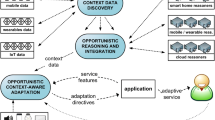Abstract
Current tools do not provide adequate support to users for handling reminders. The main reason for this is the lack of use of rich context that speci- fies when a reminder should be presented to its recipient. We describe Cybre- Minder, a prototype context-aware tool that supports users in sending and re- ceiving reminders that can be associated to richly described situations involving time, place and more sophisticated pieces of context. These situations better define when reminders should be delivered, enhancing our ability to deal with them more effectively. We describe how the tool is used and how it was devel- oped using our previously developed Context Toolkit infrastructure for context- aware computing.
Access this chapter
Tax calculation will be finalised at checkout
Purchases are for personal use only
Preview
Unable to display preview. Download preview PDF.
Similar content being viewed by others
References
Bergqvist, J., Ljungberg, F.: ComCenter: A Person Oriented Approach to Mobile Communication. Extended abstract In Proceedings of CHI 2000 (2000) 123–124
Brown, P.J.: The Stick-e Document: A Framework for Creating Context-Aware Applications. Electronic Publishing (1996) 259–272
DeVaul, R.W., Clarkson, B., Pentland, A.: The Memory Glasses: Towards a Wearable Context Aware, Situation-appropriate Reminder System. In CHI 2000 Workshop on Situated Interaction in Ubiquitous Computing (2000)
Dey, A.K., Abowd, G.D., Salber, D.: A Context-Based Infrastructure for Smart Environments. 1st International Workshop on Managing Interactions in Smart Environments (MANSE’99) (1999) 114–128
Dey, A.K., Abowd, G.D.: Towards a Better Understanding of Context and Context-Awareness. In CHI 2000 Workshop on the What, Who, Where, When, and How of Context-Awareness (2000)
Fertig, S., Freeman, E., Gelernter, D.: “Finding and Reminding” Reconsidered. SIGCHI Bulletin, Vol. 28 (1996)
Gellersen, H-W.: EMC: Environment-Mediated Communication. International Workshop on Interactive Applications of Mobile Computing (IMC’98) (1998)
Gwizdka, J.: Timely Reminders: A Case Study of Temporal Guidance in PIM and Email Tools Usage. Extended abstract in Proceedings of CHI 2000 (2000) 163–164
Herstad, J. Van Thanh, D., Audestad, J.A.: Human-Human Communication in Context. International Workshop on Interactive Applications of Mobile Computing IMC’98 (1998)
Horvitz, E.: Mixed-Initiative User Interfaces. In Proceedings of CHI 99 (1999) 159–166
Korteum, G., Segall, Z., Thompson, T.G.C.: Close Encounters: Supporting Mobile Collaboration through Interchange of User Profiles. In Proceedings of HUC’99 (1999) 171–185
Ljungstrand, P.: Context-awareness in distributed communication systems. In CHI 2000 Workshop on the What, Who, Where, When, and How of Context-Awareness (2000)
Marmasse, N.: comMotion. Extended abstract in Proceedings of CHI’99 (1999) 320–321
Miyata, Y., Norman, D.A.: Psychological Issues in Support of Multiple Activities. User Centered Design, edited by Norman, D.A., Draper, S.W. Chapter 13 (1986) 265–284
Rekimoto, J., Ayatsuka, Y., Hayashi, K.: Augment-able Reality: Situated Communication through Physical and Digital Spaces. In Proceedings of 2nd International Symposium on Wearable Computers (ISWC’98) (1998) 68–75
Salber, D., Dey, A.K., Abowd, G.D.: The Context Toolkit: Aiding the Development of Context-Enabled Applications. In Proceedings of CHI’99 (1999) 434–441
Sawhney, N., Schmandt, C.: Nomadic Radio: Scaleable and Contextual Notification for Wearable Audio Messaging. In Proceedings of CHI’99 (1999) 96–103
Schmidt, A., Beigl, M. Gellersen, H-W. There is More to Context than Location: Environment Sensing Technologies for Adaptive Mobile User Interfaces. Workshop on Interactive Applications of Mobile Computing IMC’98 (1998)
Stringer, M., Eldridge, M, Lamming, M.: Towards a Deeper Understanding of Task Interruption. In CHI Workshop on Situated Interaction in Ubiquitous Computing (2000)
Author information
Authors and Affiliations
Editor information
Editors and Affiliations
Rights and permissions
Copyright information
© 2000 Springer-Verlag Berlin Heidelberg
About this paper
Cite this paper
Dey, A.K., Abowd, G.D. (2000). CybreMinder: A Context-Aware System for Supporting Reminders. In: Thomas, P., Gellersen, HW. (eds) Handheld and Ubiquitous Computing. HUC 2000. Lecture Notes in Computer Science, vol 1927. Springer, Berlin, Heidelberg. https://doi.org/10.1007/3-540-39959-3_13
Download citation
DOI: https://doi.org/10.1007/3-540-39959-3_13
Published:
Publisher Name: Springer, Berlin, Heidelberg
Print ISBN: 978-3-540-41093-5
Online ISBN: 978-3-540-39959-9
eBook Packages: Springer Book Archive




